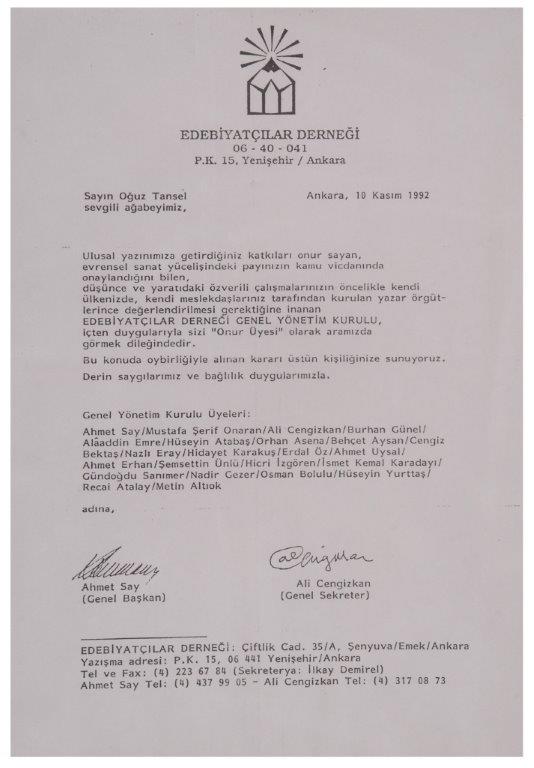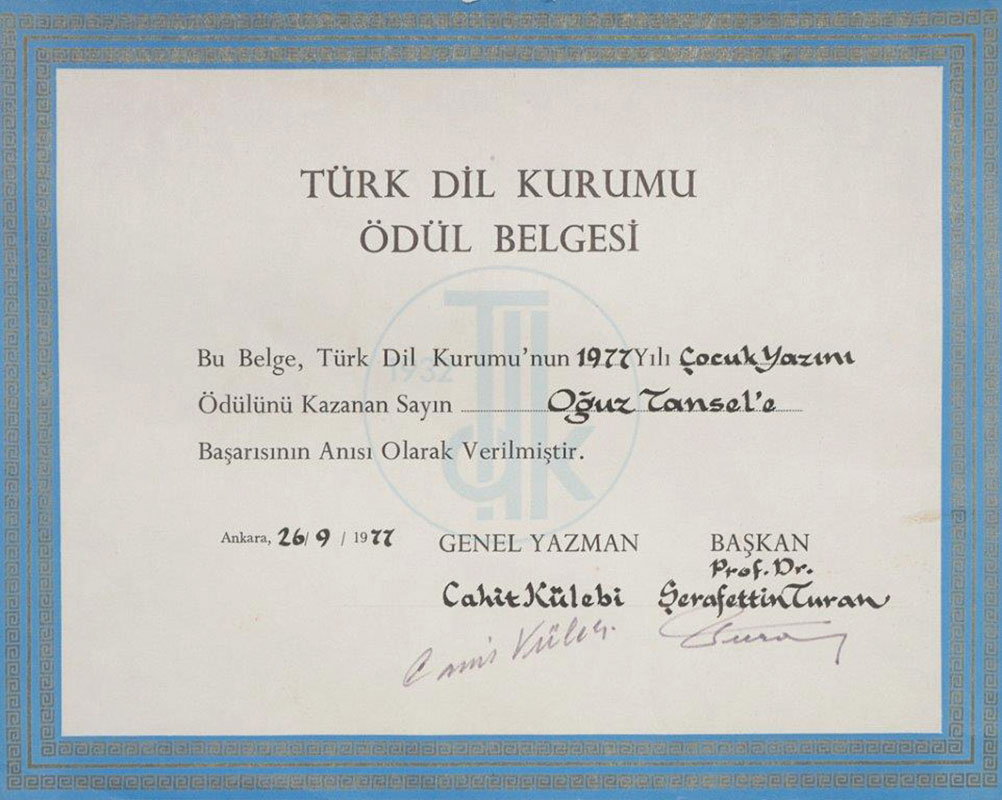Poet and Folklorist (b. February 15, 1915 – d. October 30, 1994,)
He graduated from the Davut Paşa Middle School in İstanbul and Pertev Niyal High School in İstanbul. He took up teaching as a profession as early as 1938 while studying at the Department of the Turkish Language and Literature of the Faculty of Literature at the University of İstanbul and gave it up in 1969 when he retired for health reasons.
His early poems employing rhyme and rhythm were published in the periodicals Servetifünun and Varlık and his first article appeared in Halk Bilgisi Haberleri (1937). After 1940 he was seen to turn to free verse and was noted among Turkish poets of the 1940 generation. He gained recognition with the poems and articles published in numerous literary periodicals such as Varlık, Aydınlık,Yelken, Yeditepe, Kaynak, Dost, Güney, Türk Sanatı, Kıyı, Türk Dili.
Oğuz Tansel is a uniquely lyrical voice among the Turkish poets of the 1940 generation. Adnan Binyazar compares him to “a mythical bird with three wings,” and goes on to say “that he stands out not due to his similarities, but due to his dissimilarities to others in having assimilated folklore together with modern human thought to create wisdom of his own.”
Kemal Özer says that, “among the poets of the 1940 generation who underwent an invasion in the artistic and political sense resulting in a common style and content, we see Oğuz Tansel as one of those to stands most, outside this general framework.”
Eray Canberk had the following to say about Oğuz Tansel’s poetry: “. . .These poems sound to me like a new voice from an ancient world. Not only does nature exist in those poems, but also, a nature loving person wishing to live in peace with nature while in strife and treating nature as if it were human. . . What is most unique about Tansel is, that he has fused the poetry of ancient civilizations and our own folk poetry which have both flourished over the same tract of land. In this poetry, the veins of humanism, struggle for peace and freedom and socialism eventually converge in a main artery.
Alongside writing poetry, Tansel was the scholar who, with his collection of Turkish folk tales he had recorded between the years of 1942 and 1948 in the province of Amasya, made the highest contribution-over forty types of Turkish folk tales- to the Typen Türkischer Volksmarchen catalog prepared by professors Pertev Naili Boratav and Wolfram Eberhard.
Oğuz Tansel was first to receive the Children’s Literature Award given for the first time in 1977 by the Turkish Linguistics Society. He made an important contribution to Turkish national culture with those folk tales published as children’s books. With the mastery and meticulousness derived from his poetic skill, he formed a unique, fluent narrative style.
His poems were composed to music by the American composer Prof. Bruce Reiprich. And recorded live on a CD titled Salkım Söğüt, or Weeping Willow. On the first anniversary of his death in 1995, his friends had a book The Mythical Bird with Three Wings: Oğuz Tansel (Üç Kanatlı Masal Kuşu: Oğuz Tansel) published for him.
He was a member of the Turkish Writers’ Union and honorary member of the Literary Society in Ankara.
Oğuz Tansel-Kalbiye Tansel Library donated by the his Family to the Department of Turkish Language of METU was inaugurated.
Oğuz Tansel Award for Poetry, Folklore and Children’s Literature is being given in alternate years. The award was established jointly by the Tansel Family Ankara Enlightenment İnitiative, Folklore/Literature quarterly, and Troya Folklore Association.
Municipality of Burhaniye in the province of Balıkesir had the pine forest seen in the adjacent photo, planted in Oğuz Tansel’s name (Please click for the photo).
Upon a decision by the Çiğdem Neighbourhood of the Çankaya Municipalty, the local library was given the name “Oğuz Tansel Library of Çiğdemim Association” (Please click for the photo).
Ankara Çankaya Municipality, named the Beysukent Neighbourhood park after Poet Oğuz Tansel (Please click here to see the photo).
HIS PRIZES:
He won the 1977 Turkish Language association Children’s Literature Award
HIS WORKS:
Poetry:
Tansel, Oğuz (1953) Savrulmayı Bekleyen Harman, İstanbul: Yeni Matbaa (pls click for the cover),
Tansel, Oğuz (1962) Gözünü Sevdiğim, Ankara: Dost Yayınları (pls click for the cover),
Tansel, Oğuz (1986) Sarıkız Yolu (complete poems), Ankara: Yaz Yayınları (pls click for the cover),
Tansel, Oğuz ve Metin Eloğlu (1970) Bektaşi Dedikleri (Desenler: Abidin Dino), İstanbul: İş Bankası Kültür Yayınları (pls click for the cover); (1977) İstanbul: Sander Yayınları (pls click for the cover); (1983) İstanbul: Miyatro Yayınları (pls click for the cover); (1995) İstanbul: Adam Yayınları (pls click for the cover); (2004; 2008) İstanbul: Evrensel Basım Yayın (2004 pls click for the cover – 2008 pls click for the cover ),
Tansel, Oğuz (1999; 2006; 2013) Dağı Öpmeler (ed. Aysıt Tansel), İstanbul: Yapı Kredi Yayınları (pls click for the cover),
Tansel, Oğuz (2005; 2013) Mutluluk Peşinde (Selected Poems), İstanbul: Evrensel Basım Yayın (2005 pls click for the cover – 2013 pls click for the cover),
Tansel, Oğuz (2011) At the Dawn of Oleander Blossoms (Poems on Antalya Environs in Turkish and English), Antalya: Suna-İnan Kıraç Akdeniz Medeniyetleri Araştırma Enstitüsü (pls click for the cover),
Tansel, Oğuz (2012) Masal Dünyası-World of Tales (Selected Poems in Turkish and English), Ankara: Elips Kitap (pls click for the cover),
Tansel, Oğuz (2017) Gökdeniz-Das Meer am Himmel (Selected Poems in Turkish and German/ Ausgewahlte Gedichte), Wassenberg, Almanya: Schulbuchverlag Anadolu (pls click for the cover).
Folk Tales:
Tansel, Oğuz (1959) Altı Kardeşler (Six Siblings), Ankara: Dost Yayınları (pls click for the cover); (2003), Ankara: Ministry of Education (pls click for the cover); (2011) İstanbul: Yapı Kredi Yayınları (pls click for the cover),
Tansel, Oğuz (1960) Yedi Devler (Seven Giants), Istanbul: Kutulmuş Matbaası (pls click for the cover); (2003) Ankara: Ministry of Education (pls click for the cover), (2011) İstanbul: Yapı Kredi Yayınları (pls click for the cover),
Tansel, Oğuz (1963) Üç Kızlar (Threee Sisters), Ankara: Dernek Yayınları (pls click for the cover); (2003) Ankara: Ministry of Education (pls click for the cover); ( 2011) İstanbul: Yapı Kredi Yayınları (pls click for the cover),
Tansel, Oğuz (1966) Mavi Gelin (Blue Bride), Ankara: Yaz Yayınları (pls click for the cover); (2003) Ankara: Ministry of Education (pls click for the cover); (2011) İstanbul: Yapı Kredi Yayınları (pls click for the cover),
Tansel, Oğuz (1976) Al’lı ile Fırfırı, 2 Volumes (Children’s Literature Award by the Turkish Linguistics Society, 1977) Ankara:Yaz Yayınları ((pls click for the cover); (2009: 2012; 2016) Ankara: Elips Kitap (2009 pls click for the cover 1 – 2009 pls click for the cover 2 – 2012; 2016 pls click for the cover),
Tansel, Oğuz, A. Özyalçıner et al. (1979: 2006) Bir de Varmış İki de Varmış, İstanbul: Boyut Yayın (pls click for the cover),
Tansel, Oğuz (1985) Çobanla Bey Kızı (The Sepherd and Chief’s Daughter), Ankara: Yaz Yayınları (pls click for the cover),
Tansel, Oğuz (1985) Konuşan Balıkla Yalnız Kız (Talking Fish and the Lonely Girl) Ankara: Yaz Yayınları (pls click for the cover).
Tansel, Oğuz (2018) Al’lı ile Fırfırı (Translated into Russian by: Anastasia M. Zherdeva) The Crimea: Tarpan Yayınevi (Pls click for the cover).
Tansel, Oğuz (2019) Masallar (Folk Tales) İstanbul: Yapı Kredi Yayınları (Pls click for the cover).
BOOKS ABOUT OĞUZ TANSEL:
Turan, Metin (ed.) (1995) Üç Kanatlı Masal Kuşu: Oğuz Tansel (Mythical Bird with Three Wings: Oğuz Tansel), Ankara: Ürün Yayınları (pls click for the cover).December 2018: Expanded Second Edition, Ürün Yayınları, September 2019: Expanded Third Edition, Ürün Yayınları (pls click for the cover)
Eloğlu, Metin, (2012) Canım Oğuzcuğum – Letters to Oğuz Tansel, İstanbul: Yapı Kredi Yayınları (pls click for the cover).
REFERENCE:
Altınkaynak, Hikmet (2008) Türk Edebiyatında Yazarlar ve Şairler Sözlüğü (Dictionary of Writers and Poets in the Turkish Literature) Revised Second Edition, İstanbul: Doğan Kitap, pp. 669-670.
Translated from Turkish by Ülkün Tansel


